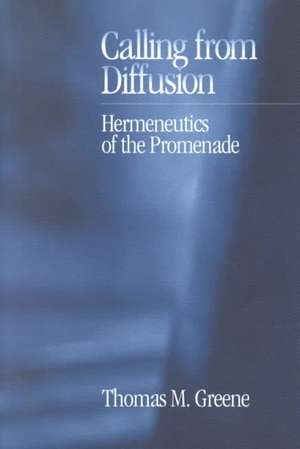Calling from Diffusion: Hermeneutics of the Promenade
Autor Thomas M. Greeneen Limba Engleză Paperback – 29 ian 2002
Based on four Nielson Lectures delivered at Smith College, this book examines a series of "promenade poems," lyrics that follow a poetic speaker moving through a landscape and responding to it. Thomas M. Greene invites the reader to consider a wide range of poets, beginning with Amy Clampitt and A. R. Ammons, continuing with Petrarch, Ronsard, Saint-Amant, Milton, Vaughan, and Marvell, and concluding with two representative Romantics, Wordsworth and Whitman.
Greene's discussions of this rich body of texts stimulate reflection at several levels. They can be read first of all simply as analyses of several memorable poems exhibiting a similar structure over a period of seven centuries. They can also be read as meditations on the workings of lyric poetry, which is always attempting to bring into sharper focus the sensibility of a speaker whose emergence depends on her naming and evoking the objects surrounding her. Thus Greene argues that the distinction of a poetic consciousness lies in its "permeability," permitting a more intimate interplay between internal and external realms. His title is drawn from a line by Whitman: "You objects that call from diffusion my meanings and give them shape!" Finally, at yet another level, Greene's book presents a way of thinking about language which, recalling the Heideggerean theory of "ereignis," suggests that only through the projective act of naming can human beings assimilate things through intuitive knowledge.
An afterword, "The Morality of Literary Interpretation," surveys critically a range of hermeneutic theories and formulates a position that accords the literary text both autonomy and mystery.
Greene's discussions of this rich body of texts stimulate reflection at several levels. They can be read first of all simply as analyses of several memorable poems exhibiting a similar structure over a period of seven centuries. They can also be read as meditations on the workings of lyric poetry, which is always attempting to bring into sharper focus the sensibility of a speaker whose emergence depends on her naming and evoking the objects surrounding her. Thus Greene argues that the distinction of a poetic consciousness lies in its "permeability," permitting a more intimate interplay between internal and external realms. His title is drawn from a line by Whitman: "You objects that call from diffusion my meanings and give them shape!" Finally, at yet another level, Greene's book presents a way of thinking about language which, recalling the Heideggerean theory of "ereignis," suggests that only through the projective act of naming can human beings assimilate things through intuitive knowledge.
An afterword, "The Morality of Literary Interpretation," surveys critically a range of hermeneutic theories and formulates a position that accords the literary text both autonomy and mystery.
Preț: 145.22 lei
Nou
Puncte Express: 218
Preț estimativ în valută:
27.79€ • 28.94$ • 23.49£
27.79€ • 28.94$ • 23.49£
Carte indisponibilă temporar
Doresc să fiu notificat când acest titlu va fi disponibil:
Se trimite...
Preluare comenzi: 021 569.72.76
Specificații
ISBN-13: 9781558493506
ISBN-10: 1558493506
Pagini: 88
Dimensiuni: 153 x 228 x 8 mm
Greutate: 0.15 kg
Ediția:First Edition
Editura: Smith College
Colecția Smith College
ISBN-10: 1558493506
Pagini: 88
Dimensiuni: 153 x 228 x 8 mm
Greutate: 0.15 kg
Ediția:First Edition
Editura: Smith College
Colecția Smith College
Recenzii
"Greene's distinguished works have long established him as one of the most sophisticated, penetrating, and sensitive close readers of poetry in his generation. His international reputation rests on the elegance of his thinking and the eloquence of his writing....This book is the mature work of a master."—Arthur F. Kinney, author of Humanist Poetics
Notă biografică
Thomas M. Greene is Frederick Clifford Ford Professor Emeritus of English and Comparative Literature, Yale University. Among his books are The Descent from Heaven, The Light in Troy, and The Vulnerable Text.
